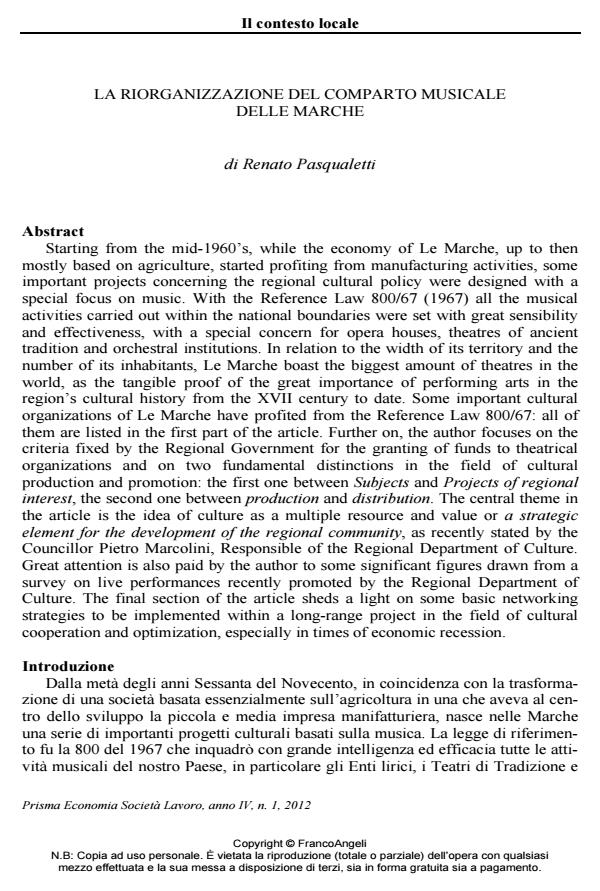La riorganizzazione del comparto musicale delle Marche
Journal title PRISMA Economia - Società - Lavoro
Author/s Renato Pasqualetti
Publishing Year 2013 Issue 2012/1
Language Italian Pages 13 P. 70-82 File size 652 KB
DOI 10.3280/PRI2012-001008
DOI is like a bar code for intellectual property: to have more infomation
click here
Below, you can see the article first page
If you want to buy this article in PDF format, you can do it, following the instructions to buy download credits

FrancoAngeli is member of Publishers International Linking Association, Inc (PILA), a not-for-profit association which run the CrossRef service enabling links to and from online scholarly content.
Starting from the mid-1960’s, while the economy of Le Marche, up to then mostly based on agriculture, started profiting from manufacturing activities, some important projects concerning the regional cultural policy were designed with a special focus on music. With the Reference Law 800/67 (1967) all the musical activities carried out within the national boundaries were set with great sensibility and effectiveness, with a special concern for opera houses, theatres of ancient tradition and orchestral institutions. In relation to the width of its territory and the number of its inhabitants, Le Marche boast the biggest amount of theatres in the world, as the tangible proof of the great importance of performing arts in the region’s cultural history from the XVII century to date. Some important cultural organizations of Le Marche have profited from the Reference Law 800/67: all of them are listed in the first part of the article. Further on, the author focuses on the criteria fixed by the Regional Government for the granting of funds to theatrical organizations and on two fundamental distinctions in the field of cultural production and promotion: the first one between Subjects and Projects of regional interest, the second one between production and distribution. The central theme in the article is the idea of culture as a multiple resource and value or a strategic element for the development of the regional community, as recently stated by the Councillor Pietro Marcolini, Responsible of the Regional Department of Culture. Great attention is also paid by the author to some significant figures drawn from a survey on live performances recently promoted by the Regional Department of Culture. The final section of the article sheds a light on some basic networking strategies to be implemented within a long-range project in the field of cultural cooperation and optimization, especially in times of economic recession.
Renato Pasqualetti, La riorganizzazione del comparto musicale delle Marche in "PRISMA Economia - Società - Lavoro" 1/2012, pp 70-82, DOI: 10.3280/PRI2012-001008